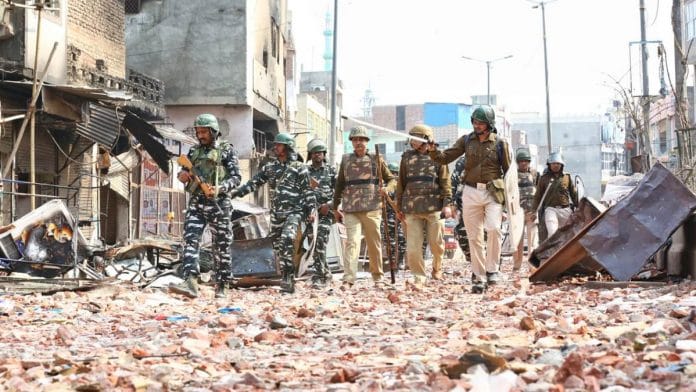New Delhi: Activists, politicians, former IPS officers and many other civil servants have raised concerns about the Delhi Police probe into the February riots that led to the deaths of over 50 people.
Nine former IPS officers even wrote to Delhi Police Commissioner S.N. Shrivastava asking him to re-investigate the riots in an “unbiased” manner. This sentiment was echoed by senior advocate Prashant Bhushan and activist Harsh Mander, who demanded that an independent commission be set up to conduct an inquiry into the Delhi Police’s investigation. Bhushan called the investigation a “criminal conspiracy”.
The clamour for an unbiased investigation increased after the police, on 16 September, filed an over 17,000-page charge sheet naming 15 people as key conspirators. These included Pinjra Tod activists Natasha Narwal and Devangana Kalita, and student activist Safoora Zargar.
However, in the midst of all this the police has maintained that they have been following protocol in their investigation. Earlier, when ThePrint spoke to additional PRO of the Delhi Police, Anil Mittal, he said the force had investigated all riots cases professionally and meticulously.
But this is not the first time that an investigation into riots by the Delhi Police has been questioned. Something similar happened during the police’s investigation into the 1984 anti-Sikh riots that took place in the national capital.
Also read: Delhi Police’s riots charge sheet is a parody scripted to prove the Boss is always right
CBI’s claims against Delhi Police
In 1984, shortly after then prime minister Indira Gandhi’s assassination by her Sikh bodyguards on 31 October, riots broke out in several places across the country, targeting Sikhs.
The riots claimed the lives of over 3,300 people and reports indicate that 2,700 of them were killed in Delhi.
In 2010, while the Supreme Court was hearing a case involving main accused and former Congress leader Sajjan Kumar, the CBI had slammed the Delhi Police for conducting a “sham investigation and farce prosecutions” in the riots.
In its affidavit, the investigative agency had said that the Delhi Police had incorrectly filed a closure report in December 2005 before the court.
Furthermore, after Kumar was acquitted by a trial court in 2018, the CBI appealed to the Delhi High Court against the acquittal, noting that the police investigation into the alleged role of Kumar was “tainted” and that the Delhi Police had tried to favour the politician.
The CBI also told the High Court that the police kept the FIRs lodged during the riots in “hibernation” hoping that the matter would eventually be settled and reconciled.
What the courts said
The courts were also critical of the Delhi Police’s investigation into the riots.
In 2017, a Delhi court criticised the police for not completing their probe in one of the cases, 33 years after the riots.
The court noted that it appeared as though the police had formed “a cartel to save” its officials who were allegedly involved in abetting the riots.
Metropolitan Magistrate Shirish Aggarwal had said, “The case is a tell-tale of a sorry state of affairs where inspite of gravity of offences, the police persistently filed half-baked police reports. Even though commission of offences were writ large, the police continued to remain in denial.”
A year later in 2018, a bench comprising justices S. Muralidhar and Vinod Goel of the Delhi High Court said there was an “abject failure” of the Delhi Police in registering FIRs and investigating the riots cases, which resulted in the accused roaming free for many years.
The Delhi HC further noted that witnesses of the 1984 anti-Sikh riots were living in fear and had lost all faith in the Police and only gathered confidence after the CBI took over the probe.
Also read: Gujarat 2002 was independent India’s first full-blooded pogrom. Delhi 1984 was a semi-pogrom
11 committees were formed to re-investigate riots
In the midst of all these claims of a botched investigation by the Delhi Police, several committees were formed to re-investigate the 1984 riots.
The first was set up in November 1984 led by then additional commissioner of police Ved Marwah to look into the role of the police in the massacre. In total, 11 such committees were convened
The most recent and eleventh committee was the Justice S.N. Dhingra Committee that was set up in 2017. It was headed by former judge of the Delhi High Court Justice S.N. Dhingra and the committee’s report to the Supreme Court in 2019 blamed the “lack of interest shown by the police” in letting several accused of the riots go scot-free.
The report further highlighted the manner in which the investigation was conducted and said that the Delhi Police did not preserve any forensic evidence and did not contact family members of some of the people killed in the 1984 riots.
The Justice Dhingra Committee report also claimed that then SHO of Kalyanpuri inspector Survir Singh Tyagi was “in a conspiracy with rioters”.
Also read: Kejriwal is wrong. Delhi to Gujarat, outsiders blamed in riots, but most victims know attackers






